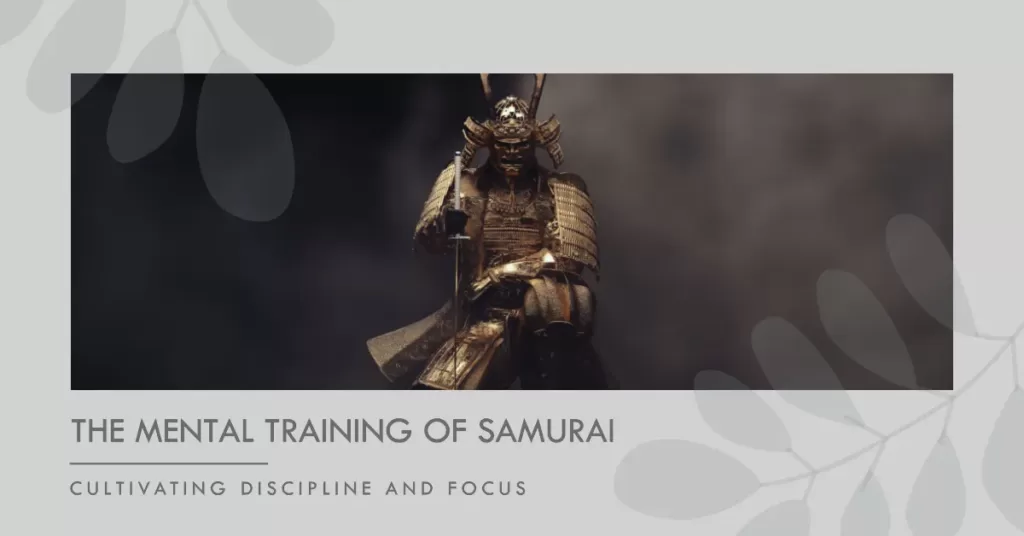In the vast history of Japan, few periods are as captivating as the Tokugawa period, known for its strict codes of conduct and unwavering commitment to honor and discipline. Behind the iconic image of the sword-wielding samurai warriors lies a fascinating aspect that often goes unnoticed: their unparalleled mental training. While physical prowess was undoubtedly crucial on the battlefield, it was their unyielding mental toughness that truly set these elite warriors apart. Drawing from centuries-old traditions and philosophies, the mental training techniques employed by samurai encompassed a wide range of practices aimed at cultivating focus, resilience, and clarity in even the most trying circumstances. In this article, we delve into the remarkable world of samurai mental training to uncover its secrets and explore how it shaped these legendary warriors into masters of both swordsmanship and self-control.
Table of Contents
The Way of the Samurai
The way of the samurai is not simply about mastering the art of combat, but it also includes a unique mental training that sets them apart from other warriors. One legendary samurai who exemplified this philosophy was Miyamoto Musashi. Through his writings and experiences, Musashi emphasized the importance of cultivating a steadfast mind and unwavering focus in order to achieve mastery. He believed that true strength came from within, and it was only through rigorous mental training that one could reach their full potential as a samurai.
One key aspect of this mental training involved learning to embrace fear rather than letting it paralyze you. Musashi understood that fear is a natural response in dangerous situations, but he advocated for transcending this fear by embracing it as an integral part of oneself. By acknowledging and accepting fear, samurai were able to maintain composure even in life-threatening scenarios, making them formidable opponents on the battlefield.
Another crucial element in the mental training of samurai was mastering emotional control. These warriors had to learn how to detach themselves from their emotions during combat in order to make sound decisions swiftly and without hesitation. They understood that allowing anger or rage to cloud their judgment would lead to defeat, so they trained themselves rigorously to maintain an inner calmness amidst chaos.
The way of the samurai encompassed more than just physical prowess; it involved a deep commitment to psychological development and self-discipline.
The Importance of Mental Training
In the world of the samurai, mental training was as important as physical prowess. Samurai warriors understood that their success on the battlefield depended not just on their physical strength and skills with a sword, but also on their ability to maintain a calm and focused mind in the face of adversity. This is why mental training played such a crucial role in their lives, shaping not only their warrior spirit but also their everyday actions.
One of the ways samurai would cultivate mental discipline was through engaging in activities like the tea ceremony. Far more than just boiling water and steeping leaves, this traditional Japanese ritual required immense concentration and mindfulness. By meticulously following each step of the ceremony, from preparing and serving tea to appreciating its taste and aroma, samurai cleared their minds of distractions and sharpened their focus.
Moreover, many samurai warriors carried lucky charms into battle as another form of mental training. These objects acted as tangible reminders of inner strength and determination when faced with danger or uncertainty in combat. By placing their trust in these symbols, they sought to bolster confidence in themselves and diminish fear while confronting seemingly insurmountable odds.
Mental training was not an ancillary pursuit for samurai; it constituted a core part of their identity as warriors. The practices they employed – such as participating in tea ceremonies or relying on lucky charms – demonstrate that cultivating a strong mind was just as important as honing one’s physical abilities.
Zen and Meditation Practices
Zen and meditation practices played a pivotal role in the mental training of samurai warriors. Although often associated with physical strength and combat skills, samurai were also deeply committed to cultivating inner peace and harmony through Zen meditation. Through regular practice, they honed their ability to detach from external distractions, gain clarity of mind, and achieve a heightened state of awareness.
Despite popular belief that samurai were exclusively male, there were also remarkable female warriors who embraced the teachings of Zen. These samurai women recognized the significant role that mindfulness played in their training, enabling them to match or even surpass their male counterparts in skill and discipline. The incorporation of Zen philosophy allowed these women to tap into their intuitive strengths and develop a warrior mind – a mind uncluttered by doubt or fear – resulting in greater focus, resilience, and strategic thinking on the battlefield.
Zen and meditation practices were integral components of the mental training of both male and female samurai warriors. By embracing these practices, they unlocked their inner potential, cultivated a calm yet sharp mindset, and elevated themselves beyond mere physical prowess. Let us take inspiration from these ancient traditions as we seek our own paths toward personal growth and self-mastery through mindfulness and meditation.
Bushido: The Code of the Samurai
Bushido, commonly known as the code of the samurai, is more than just a set of rules governing physical combat. It also encompasses a deep understanding and cultivation of the mind. The mental training that samurai undergo is often overlooked but plays a crucial role in their way of life. Much like their physical training, their mental training is rigorous and discipline-oriented.
One central aspect of this mental training is mindfulness. Samurai are taught to be fully present in every moment, whether it be during battle or while performing mundane tasks. Through meditation and concentration exercises, they develop an acute awareness of their thoughts, emotions, and surroundings. This heightened state of mindfulness allows them to swiftly assess situations and make split-second decisions with clarity.
On top of that, samurai culture heavily emphasizes self-mastery through emotional control. They are trained to have mastery over their emotions in order to remain calm and composed even in the face of danger or adversity. By practicing emotional detachment from external outcomes or desires, samurai learn not to let circumstances dictate their actions or cloud their judgment.
While physical prowess may be what first comes to mind when thinking about samurai culture, it is important not to overlook the significant role that mental training plays in shaping these warriors’ mindset. From cultivating mindfulness to mastering emotional control, samurai understand that true strength lies not only in being able to wield a sword skillfully but also having a disciplined mind that can navigate any challenge with unwavering focus and resilience.
Focus and Discipline in Combat
Imagine yourself in Feudal Japan during the Edo period or Meiji Restoration, surrounded by chaos and uncertainty. As a samurai, your training not only prepared you physically but also mentally for these unpredictable battles. One of the most crucial elements that defined a successful samurai was their unwavering focus and discipline in combat.
In a world where split-second decisions could be the difference between life and death, maintaining absolute concentration on the task at hand was paramount. Distractions had no place on the battlefield; they could cost you your life or that of your comrades. Samurai warriors mastered the art of quieting their minds, shutting out external noise and internal doubts to attain an unbreakable state of focus.
Discipline was equally essential, allowing samurai to endure pain, fatigue, or fear without veering from their duty. Through rigorous training regimens and adherence to strict codes like Bushido (the way of the warrior), they honed their self-control and forged an iron willpower that enabled them to maintain composure even under extreme pressure.
The mental training of the samurai in focus and discipline was a complex process that involved meditation techniques, mental fortitude exercises, and profound introspection. These warriors understood that true victory came not just from superior strength or skill but from an unyielding mind capable of channeling energy into every strike with precision.
Overcoming Fear and Embracing Death
In the world of martial arts, particularly the ancient traditions practiced by samurai, fear and death were constant companions. The samurai code demanded unwavering courage in the face of mortal danger, as they were trained to embrace death rather than fear it. Surprisingly, this mindset cultivated a unique sense of liberation and allowed them to live fully in each moment.
Overcoming fear was a fundamental aspect of their mental training. By acknowledging that death is an inevitable part of life, they learned to detach themselves from the fear that holds most people hostage. Instead of suppressing their anxieties or avoiding thoughts about mortality, they confronted these fears head-on during rigorous training exercises and meditation sessions. This undeterred gaze into their own mortality enabled them to cultivate a deeper appreciation for life’s fleeting nature.
The samurai took it upon themselves to constantly remind one another that death was always at their doorstep. They forged an intimate relationship with mortality through daily rituals centered around funeral practices and contemplation on impermanence. Surrounded by reminders of life’s ephemeral nature, they viewed each day as an opportunity for growth and did not hesitate to pursue their passions wholeheartedly.
Embracing death did not mean recklessness or disregard for self-preservation on the battlefield; rather, it meant finding solace within one’s own mortality and using this understanding as a catalyst for fearless action. By accepting that every breath could be their last, these warriors tapped into newfound bravery that fueled extraordinary feats.
Conclusion: Cultivating a Warrior’s Mindset
Cultivating a warrior’s mindset is not simply about physical strength or relentless aggression. It goes beyond the battlefield and delves into the depths of one’s mind and spirit. The mental training of samurai incorporates principles from Zen Buddhism, emphasizing the importance of mindfulness and inner peace as catalysts for success.
Zen Buddhism teaches us to be fully present in every moment, to embrace impermanence, and to let go of attachments. These teachings guide samurai warriors in their quest for mastery over both their external enemies and their internal struggles. By embracing these principles, they are able to maintain clarity of thought even in the midst of chaos. This unwavering focus becomes their greatest weapon on the battlefield.
Furthermore, an essential aspect of cultivating a warrior’s mindset is the use of omamori, amulets believed to bestow protection and good luck upon their wearer. Just as a warrior arms themselves with weapons before battle, samurai would carry omamori for spiritual protection and confidence. These sacred charms serve as constant reminders of their purpose, instilling them with courage and fortitude during times of adversity.
To truly cultivate a warrior’s mindset requires discipline, self-reflection, and an unwavering commitment to personal growth. It is through this deliberate practice that warriors transform into individuals who are ready to face any challenge with resilience and grace.





2 Comments. Leave new
very insightful and much edifying
Glad you like it. May the strength be with you!